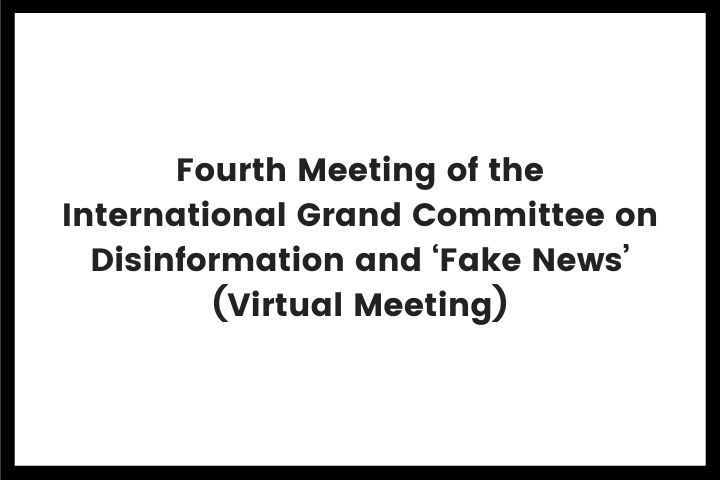EVENTS
Singapore Parliamentarians Participate in the Fourth Meeting of the International Grand Committee on Disinformation
01 Dec 2020 to 02 Dec 2020
Two Singapore Members of Parliament participated in the fourth meeting of the International Grand Committee on Disinformation (IGC), held virtually on 1 and 2 December 2020. They were Dr Janil Puthucheary, Member of Parliament for Pasir Ris-Punggol GRC, and Senior Minister of State, Ministry of Communications and Information and Ministry of Health; and Mr Edwin Tong, Member of Parliament for Marine Parade GRC, Minister for Culture, Community and Youth and Second Minister for Law.
The IGC is an international group of parliamentarians who come together to discuss major concerns about the damage that online platforms are doing to their nations’ social fabrics and democratic systems. Singapore participated in the past three editions of the IGC in London, UK in November 2018; Ottawa, Canada in May 2019; and Dublin, Ireland in November 2019.
This year, the four key themes of the fourth IGC meeting were i) harmful online content and disinformation, ii) electoral interference, iii) platform market dominance, and iv) data privacy. There was broad agreement that self-regulation by online platforms is insufficient, and national legislatures must act to combat online harms. Besides Singapore, parliamentarians from Canada, France, Germany, Ireland, India, Italy, Malaysia, the UK and the US also participated in this meeting.
On Day 1, in a closed-door session, parliamentarians discussed the pressing issues in their countries posed by online harms. Dr Puthucheary spoke on how the world is facing a full-blown ‘infodemic’, where falsehoods that used to be at the margins, now move easily into the mainstream. He emphasised that some degree of regulation is needed to deal with falsehoods and harmful content, in order to maintain free speech and democratic processes, and that the responsibility cannot be left solely to the tech companies.
On Day 2, presentations were delivered on legislative efforts in various countries, such as the UK and US, to tackle online harms and regulate platforms. UK representative and founder of the IGC, Mr Damian Collins MP, advocated for the inclusion of misinformation and disinformation within the scope of the forthcoming Online Harms Bill, which the Government has said may be released in 2021. Mr Collins also commended the steps taken by several countries, including Singapore, to regulate electoral disinformation, and called for greater international cooperation to tackle online harms and to regulate tech companies. Dr Puthucheary responded to Mr Collins’ presentation, stating that public responsibilities to ensure citizens are not misled or misinformed could not be outsourced to the tech companies, and the UK Online Harms Bill was likely to be a turning point that Singapore would be studying closely. He also highlighted that the Internet would be safer if like-minded countries and partners come together to maintain this public space.
Mr Tong responded to US Representative Jan Schakowsky’s presentation on the draft Online Consumer Protection Bill in the US. This Bill would facilitate consumer lawsuits against tech companies for failing to enforce policies on harmful content. Mr Tong highlighted that falsehoods can have another pernicious effect, by interfering with election outcomes and undermining democracy. He observed that the tech companies had temporarily suspended certain features during the recent US elections. This showed that to protect against electoral disinformation, these companies simply cannot go on with business as usual. Ultimately, it is the responsibility of legislatures to hold the tech companies to account, with not just moral suasion but also the force of the law.
Dr Puthucheary further shared how Singapore has, in parallel, taken the approach of optimising regulations around data protection, and pursuing digital economy agreements with like-minded economies. This approach aims to create space for tech companies to innovate and find alternatives to a business model that profits from online harms and misinformation.
Across both days, the discussions revealed a strong consensus among participating parliamentarians. Among the key themes that emerged were how tech companies should not be trusted to self-regulate; that there is no place today for a broad legal immunity for tech companies; and that social media platforms need to be overhauled at a fundamental level, including how their algorithms collect and deliver information.

